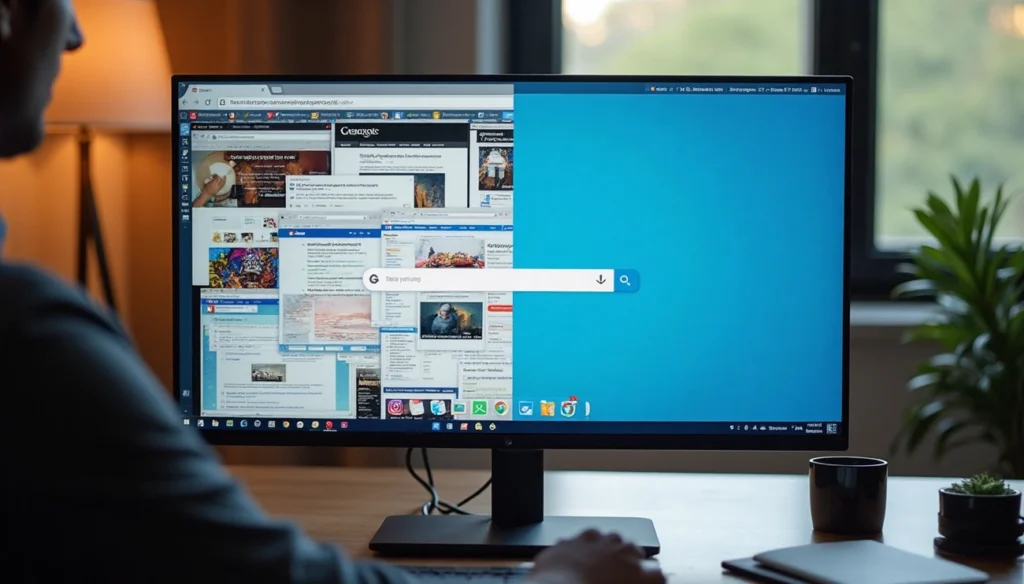Andi AI has transformed my online search experience. AI-powered search engines like Google’s Gemini and Microsoft’s Copilot are now common alternatives to traditional search. But I found something even better while looking for the best AI search engine.
Frustrated with endless ads and irrelevant search results? You’re not alone. Andi search AI feels like talking to a smart friend who gives you direct answers instead of just a list of links. The platform runs without ads or traditional tracking systems. This private AI search engine generates specific answers through advanced algorithms rather than just linking to other sites.
Andi AI stands out from other search tools in unique ways. The platform doesn’t track your activity like Google does. Its clean design lets you focus on what’s important. On top of that, it shows you its sources so you can check the information yourself. Let me share my real experience switching from Google to Andi AI and why you might want to give it a try too.
Why I Started Looking Beyond Google

Image Source: Freepik
Google was my trusted search companion for years until search fatigue hit me hard. The search results became so cluttered that finding relevant information turned into a real challenge.
Search fatigue and cluttered results
Andi AI saved me after I got tired of Google’s overcrowded results pages. The first page has turned into a maze of ads, features, and AI overviews that push actual organic content way down. You need to scroll past so many distractions just to find useful information.
Reddit and Quora results have made searching tougher than ever. These platforms sometimes give good insights, but you have to dig through personal opinions and unverified claims to find facts. Many searches now start and end on Google without clicks to the open web—experts call these “zero-click searches.”
Google’s first page got so bloated that I had to look beyond it to find quality results—something that rarely happened before. The personalized results created a filter bubble as Google’s algorithms showed me what they thought I wanted to see.
Concerns about data privacy and tracking
My privacy concerns made me look for alternatives. Google’s business model depends on collecting huge amounts of user data, which raises serious privacy issues. They track everything from your search history to location, personal information, and browsing habits across your devices and platforms.
Here are some eye-opening facts:
- 85% of users globally want tighter control over their data
- 87% of U.S. voters support restrictions on the sale of personal data without consent
- 86% of U.S. voters support limits on what companies can collect in the first place
Chrome browser is a big privacy risk. Google controls your browser, search engine, and has tracking scripts on most websites you visit. They can track you from multiple angles. Their privacy policies are complex and full of technical jargon. Nobody really knows what data they collect or how they use it.
Desire for a more focused AI search experience
The need for a focused search experience that AI could provide pushed me to make the switch. Google overwhelms you with information instead of giving straight answers. Their AI features like AI Overviews feel bolted on and clumsy.
Andi AI search engine gave me what I needed—a clean, ad-free interface with summarized answers instead of endless links. This saves time by predicting what users want and suggesting relevant results. AI-powered search will become the main search method for 90 million users in the US by 2027.
Private AI search with Andi feels more user-friendly than Google’s complex interface. I was nervous about leaving Google at first, but the quality difference between Google and other search engines doesn’t matter anymore. My priority became finding a search engine that protects my privacy while giving focused, AI-driven results.
Discovering Andi AI Search Engine
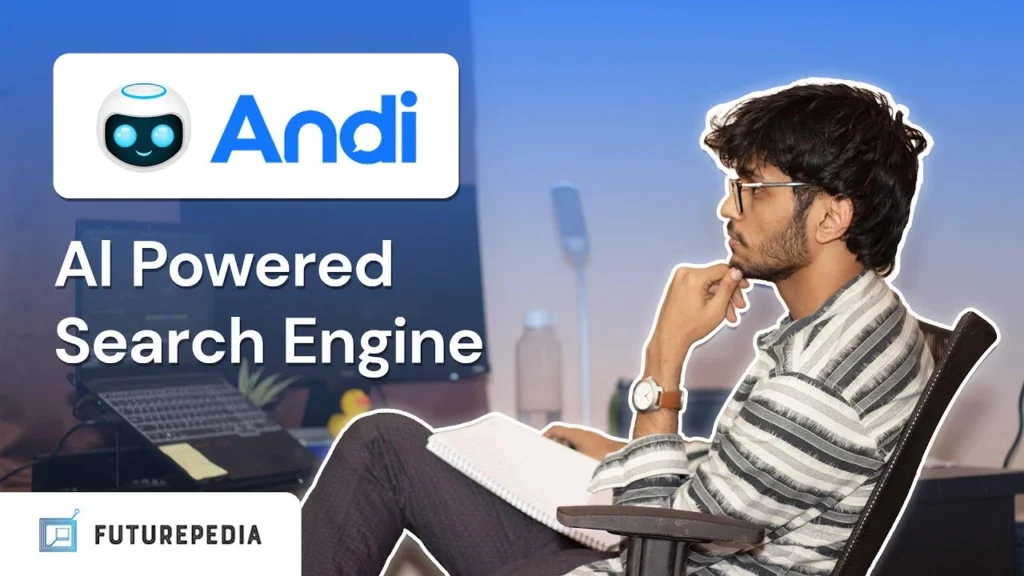
Image Source: Futurepedia
Andi AI caught my eye on a day when I was tired of endless search results. This AI search engine brings a fresh way to find information online.
What is Andi AI search?
Andi AI is a next-generation search assistant founded in September 2021 by Angela Hoover and Jed White. Traditional search engines flood you with links, but Andi gives you direct answers and works as your intelligent digital companion.
Andi combines advanced language models with semantic search to understand your questions’ context and intent. This mix helps Andi process natural language queries and give factual, concise responses instead of endless website lists.
Andi works as an AI search agent that answers questions, finds information, and creates content for you. The platform runs without ads, tracking, or personal data collection. The company says Andi never collects personal data, stores cookies, IP addresses, locations, or logs your searches.
Andi shows information through an accessible interface with cards, summaries, and visual elements that showcase quality content. This design makes the search experience more engaging and available.
How I found it and first impressions
I read about Andi search AI in a tech newsletter and decided to try it out. The original interface surprised me—instead of a regular search box, I saw a conversational chat-like screen that let me ask anything.
The platform felt new and different. Its clean, ad-free design was a welcome change from Google’s busy pages. Andi didn’t just give answers but showed its sources, which made fact-checking easy.
The response format stood out—Andi gave direct answers while showing relevant web results in a side panel. Desktop users see results next to their answer in a modern, appealing design. I found that there was a “Read” option that shows clean, ad-free versions of articles without leaving Andi.
The “Summarize Results” option that creates detailed explanations when needed was a nice bonus. This feature saved me lots of time compared to my old search habits.
Why it stood out from other AI search engines
Andi AI search engine shines through several key features. An independent standard released in September 2024 ranked Andi as the top AI search engine for factual accuracy, beating You.com, Google Gemini, ChatGPT, and Perplexity. Andi scored 87% on correctness, while You.com got 80%, Google Gemini 71%, ChatGPT 62%, and Perplexity 59%.
Andi’s visual approach to results makes it special. Users can switch between Feed, Grid, or List views based on their needs. This flexibility makes information easier to find.
The private AI search experience sets Andi apart. This privacy-focused search tool works without cookies or tracking. It opens external links in new windows without referral information to protect your search privacy.
Among all the AI search engines I tested, Andi felt the most natural—like having a conversation instead of typing queries into a box. This conversational style gets more accurate results by focusing on meaning and context rather than just matching keywords.
Andi ended up standing out because it combines accuracy, privacy, and intuitive design—fixing the exact issues that made me leave traditional search engines.
Key Features That Made Me Switch
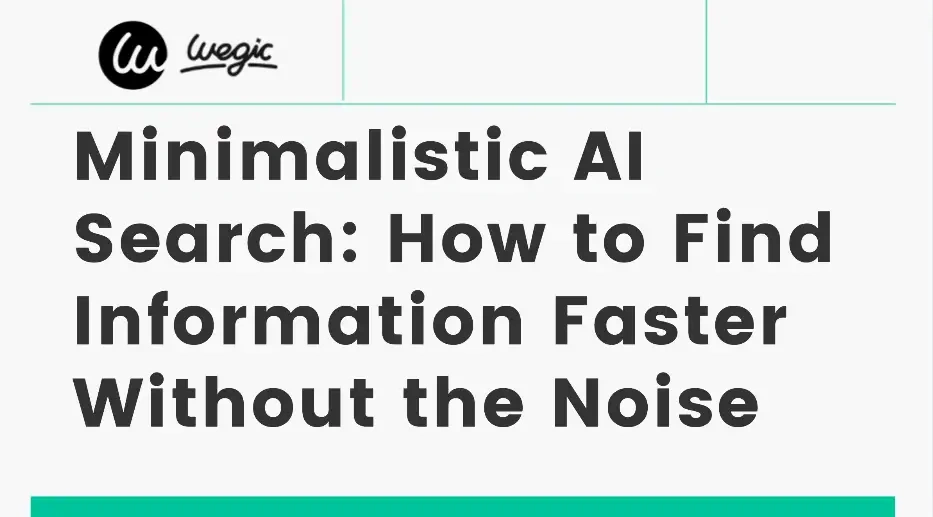
Image Source: Wegic AI
Andi AI’s features made me switch from Google after feeling frustrated with search engines for years. The mix of easy-to-use interface and smart technology made me wonder why I waited so long.
Clean, ad-free interface
My first impression of Andi search AI was its clean interface. Google’s results pages have become more cluttered, but Andi gives you an ad-free experience without spam or distractions. This clean design looks great and changes how you find information.
The experience feels like chatting with a smart friend instead of looking at a digital billboard. The lack of ads creates a space where finding information becomes easy again.
Summarized answers instead of endless links
The main reason I switched to this AI search engine comes down to how it shows information. Andi gives direct answers to questions rather than showing endless links. You save time because there’s no need to visit multiple websites to find what you need.
Andi tries to understand what you want and gives you summarized results that answer your question. The “Summarize Results” feature helps with complex questions by giving detailed explanations about exactly what you need to know.
Private AI search with no tracking
Privacy concerns pushed me toward Andi’s data protection approach. This private AI search engine:
- Never tracks or logs your searches
- Doesn’t use cookies or collect personal data
- Opens external links without referral information
- Never sells user data to third parties
Andi creates a private search space where you can browse without worrying about tracking or profiling.
Visual cards and result filtering
Smart summary cards highlight quality content in an easy-to-read format. You can adjust how results appear based on your needs by choosing list, grid, or feed layouts.
The “View in Reader” button lets you read content in a secure mode that blocks tracking and removes distractions.
Mobile-friendly and fast performance
Andi AI search engine runs fast without compromising quality. Pages load quickly on computers and phones, which makes searching on the go simple. Andi shows initial results right away and keeps searching deeper for complex questions.
The mobile version works just as well as the desktop one, which convinced me to make Andi search my go-to option on all my devices.
How Andi Compares to Google and Other AI Engines
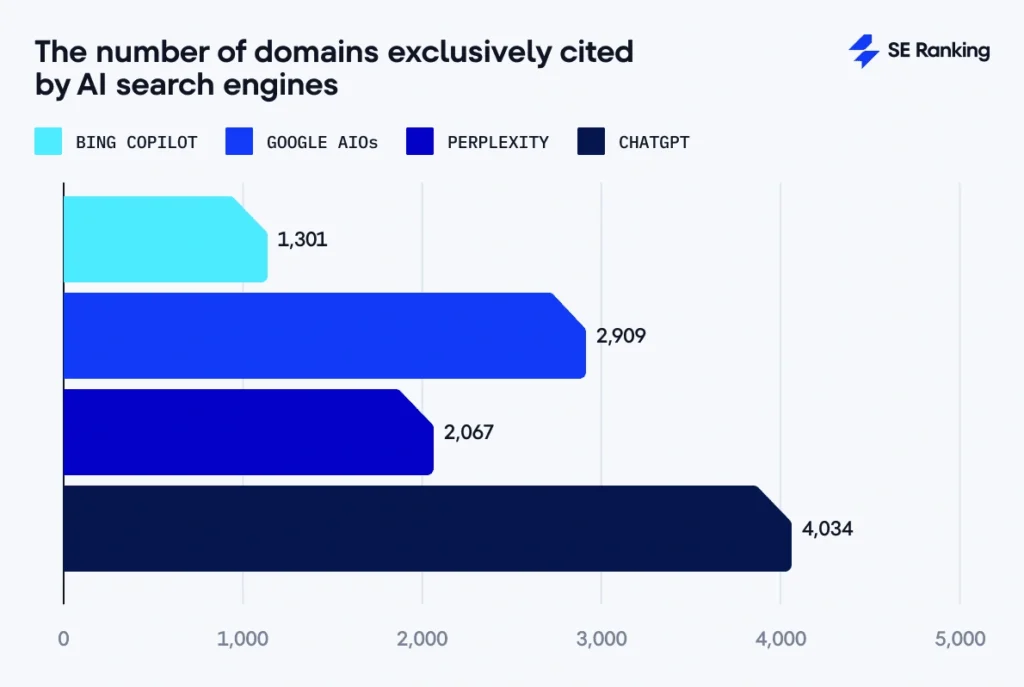
Image Source: SE Ranking
Comparing Andi AI with other search tools shows why it’s becoming the best AI search engine in 2025. Independent measures reveal Andi’s impressive 87% accuracy score beats major competitors.
Andi vs Google: Simplicity vs complexity
Andi AI works differently than Google. Andi gives straight answers while Google organizes billions of webpages. Users notice this difference right away in their interfaces. Andi provides a clean, ad-free experience. Google’s results pages have grown more cluttered over time.
The contrast between simple and complex extends to how they deliver information. Andi grasps web content meaning instead of just matching keywords. This deeper understanding helps Andi give direct answers. Users don’t need to dig through Google’s complex results.
Andi vs Perplexity: Speed and clarity
Andi search beats Perplexity when it comes to speed. Perplexity’s response time averages 6.29 seconds, which is by a lot slower than competitors. Andi delivers quick results without losing quality.
Both tools care about user privacy, but Andi protects it better by not tracking or saving search history. In fact, Perplexity keeps user data as long as accounts stay active. This makes Andi the clear winner for privacy-focused users.
Andi vs ChatGPT Search: Context and usability
Andi AI search engine runs more efficiently than ChatGPT Search. ChatGPT needs account sign-in for most features. Andi works without any registration.
Tests show Andi’s 87% correctness score is so much better than ChatGPT’s 62%. ChatGPT handles conversation context well but doesn’t deal very well with factual accuracy.
Andi vs You.com: Productivity vs general use
You.com markets itself as an “AI workplace for productivity”. It offers specialized tools for research, content creation, and computation. Andi search AI aims for general search excellence with its proprietary Trantora technology that analyzes meaning and credibility.
Both platforms rank high in accuracy tests. Andi scored 87% while You.com reached 80%. All the same, they serve different purposes. You.com excels at organizing complete information on single pages. Andi focuses on providing clear, trustworthy answers without extra clutter.
Limitations and What I Still Use Google For
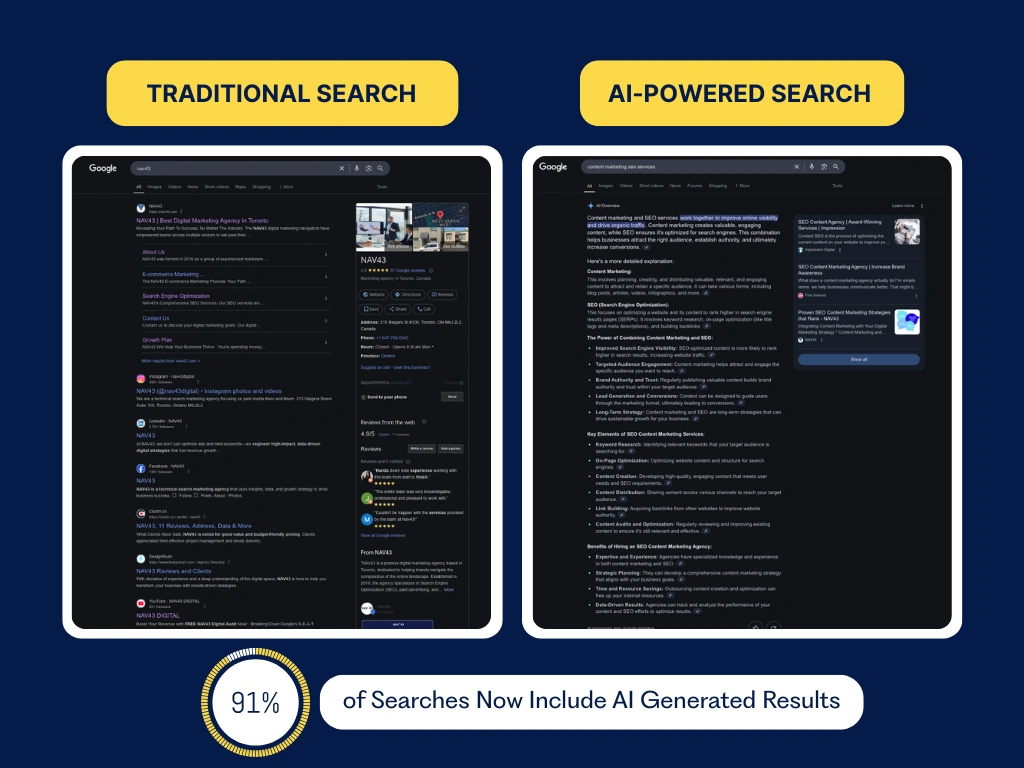
Image Source: NAV43
Andi AI has become my favorite search tool. Still, there are times I find myself going back to Google. These specific examples show where even the best AI search engines have room to grow.
At the time I need deep research or academic papers
Google Scholar stands alone in academic research. It has an impressive collection of scholarly content that includes:
- Peer-reviewed journals and books
- Conference papers and theses
- Technical reports and court opinions
- Patents and academic abstracts
Google’s smart algorithms sort through billions of pages to find quality and relevant results. Right now, Google Scholar covers about 90% of scholarly documents on the web. This is a big deal as it means that it’s more complete than Andi search AI for academic searches. Google Scholar lets users filter by date and connect to university library subscriptions – features that AI search tools don’t have yet.
Google’s advantage in real-life news and maps
Google really shines with local search results, especially if you’re looking for nearby services. Its smooth connection with Google Maps creates an experience for location-based searches that Andi AI search engine hasn’t matched yet.
Google’s personalized news feeds give it the upper hand for breaking news. I often switch to Google to follow current events and breaking stories. The numbers back this up – Google holds 79% of desktop search share and an impressive 95.5% of mobile search market.
Voice search and app integrations
Google Lens helps over 1.5 billion people monthly with visual searches. This largest longitudinal study of visual search capability, among other Google’s voice search features, offers tools that private AI search alternatives are still working on.
The way Google services work together creates a smooth experience that Andi search hasn’t matched yet. I usually pick Google for mixed searches (combining text, voice, and images) or when I need deep connections with other apps.
Even with these gaps, Andi AI handles my everyday searches better than Google. I notice myself using Google less as Andi keeps getting better and adding new features.
Conclusion
Andi AI search engine has transformed my online information search experience. The clean interface gives me direct, accurate answers without the clutter of ads and irrelevant links. The 87% accuracy rate beats other AI search options, which makes Andi AI my trusted companion for daily searches.
Google remains the go-to choice for academic research, breaking news, and maps. But Andi handles my everyday searches better. I save time with ad-free results and summarized answers. The privacy-first approach gives me peace of mind. Of course, breaking free from Google’s tracking-heavy system feels like a breath of fresh air.
Each update makes Andi’s AI search better. I find myself using Google less often. The private search experience works smoothly on both desktop and mobile now. Anyone tired of messy search results and privacy issues should give Andi a try – it delivers what it promises.
Bonus Tip: Want to grow your remote side gig? Mehnav can help you build a personal website or portfolio to showcase your work. We create modern, beautiful, and fast websites that remote workers and freelancers love.
The search landscape is moving toward individual-specific experiences with direct answers instead of endless link lists. Andi AI leads this transformation with its conversation-style approach that delivers exactly what you need. We have a long way to go, but we can build on this progress. Andi has earned its place as my main search engine – making my online experience better and more efficient.
Key Takeaways
After switching from Google to Andi AI, here are the most important insights that could transform your search experience:
• Andi AI delivers 87% accuracy in search results, outperforming Google Gemini (71%), ChatGPT (62%), and Perplexity (59%) in independent benchmarks.
• Complete privacy protection – Andi never tracks searches, stores cookies, or collects personal data, unlike Google’s extensive tracking ecosystem.
• Direct answers replace endless links – Get summarized responses instantly instead of scrolling through cluttered pages filled with ads and irrelevant results.
• Clean, ad-free interface eliminates distractions and creates a conversation-like search experience that feels more natural and efficient.
• Google still wins for specialized needs like academic research, real-time news, maps, and voice search integrations, making a hybrid approach most practical.
While Andi AI handles most daily search needs more effectively than Google, the key is recognizing when each tool serves you best. The future of search is moving toward direct, personalized answers rather than link bombardment – and Andi represents this evolution perfectly.
FAQs
Q1. How has AI impacted Google search results?
AI has led to an increase in low-quality, auto-generated content in search results. This has made it more difficult for users to find relevant and trustworthy information, causing many to turn to alternative platforms like Reddit for answers.
Q2. What are some alternatives people are using instead of Google search?
Many users are now relying on platforms like Reddit, specialized AI search engines like Perplexity, and even TikTok for certain types of information. These alternatives often provide more direct answers or community-sourced information that users find more helpful.
Q3. How can I improve my Google search results?
To get better results, try adding “Reddit” to your search query, using the “before:[year]” filter to exclude recent AI-generated content, or utilizing Google’s “Forum” filter. These techniques can help you find more relevant and human-generated information.
Q4. Are there any privacy-focused alternatives to Google search?
Yes, there are privacy-focused search engines like DuckDuckGo and Andi AI that don’t track user data or store search history. These alternatives aim to provide relevant results without compromising user privacy.
Q5. How is Google responding to the challenges posed by AI in search?
Google is working on integrating its own AI technology, like Google Gemini, into search results. They’re also experimenting with features like AI Overviews to provide more direct answers. However, the effectiveness of these solutions is still debated among users.

